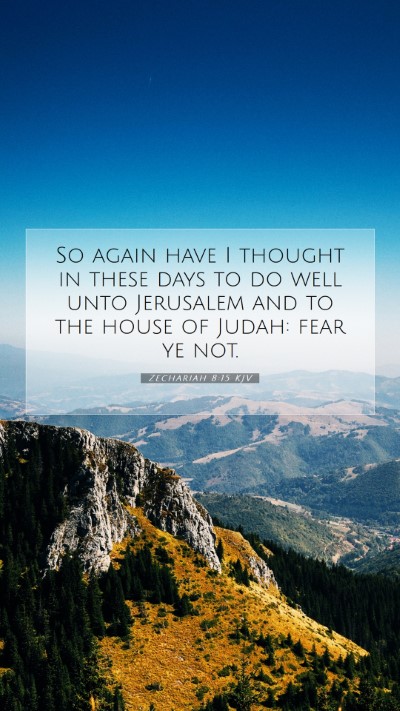Understanding Zechariah 8:15
Zechariah 8:15 states:
"So again have I thought in these days to do well unto Jerusalem and to the house of Judah: fear ye not."
This verse is part of a broader prophetic message concerning the restoration of Jerusalem and the encouragement of its people. Below, we explore the meanings and interpretations provided by well-respected public domain commentaries.
Contextual Overview
Zechariah's prophecies were given during a time when the Jewish exiles were returning to rebuild Jerusalem after the Babylonian captivity. The message is one of hope and reassurance from God, emphasizing His continued favor towards His people.
Insights from Matthew Henry
Matthew Henry emphasizes the nature of God’s intentions. He explains that God's thoughts towards Jerusalem are aimed at good, underscoring the theme of divine favor despite the people's past transgressions. Henry points out that this verse serves as a reminder of God's unwavering commitment to bless His people and restore them, highlighting the importance of trusting in God's plans.
Albert Barnes' Commentary
Albert Barnes provides a detailed exegesis of this verse, stating that the phrase “to do well” encompasses God's plans for prosperity, peace, and restoration. Barnes interprets the instruction to "fear ye not" as a reassurance to the people, reminding them that despite adversities and challenges, God is actively working for their good. He echoes a theme of optimism in the prophetic context, emphasizing that God’s intentions are benevolent.
Adam Clarke's Perspective
Adam Clarke expounds on the significance of fear in this passage. He notes that the call to “fear ye not” suggests a presence of fear among the people, arising from uncertainty about their future. Clarke interprets this as God dismantling their fears by affirming His intent to bless them. He further elaborates on the covenantal aspect of God’s promise, reinforcing the concept that God's faithfulness to His people is unchanging.
Key Themes
- Divine Favor: God’s continuous intent to bless His people regardless of their circumstances.
- Restoration: The promise of renewal for Jerusalem and the house of Judah.
- Encouragement: God encourages His people to dismiss fear and trust in His goodness.
- Covenantal Faithfulness: God’s unwavering commitment to His promises and His people.
Cross References
- Jeremiah 29:11: “For I know the thoughts that I think toward you, saith the Lord, thoughts of peace, and not of evil, to give you an expected end.”
- Isaiah 41:10: “Fear thou not; for I am with thee: be not dismayed; for I am thy God: I will strengthen thee; yea, I will help thee; yea, I will uphold thee with the right hand of my righteousness.”
- Romans 8:28: “And we know that all things work together for good to them that love God, to them who are the called according to his purpose.”
Application of the Verse
Zechariah 8:15 encourages believers to trust in God's plans for their lives. Just as He reassured the people of Judah, modern readers can find comfort in knowing that God is actively working for their good as well. Here are some practical applications:
- When facing uncertainties, remember that God has a plan for your future.
- Embrace the assurance that God works out situations for your benefit, encouraging a faith-filled perspective.
- Reflect on past experiences of God’s faithfulness to bolster current faith amidst doubt.
Conclusion
Zechariah 8:15 serves as a profound reminder of God's benevolent intentions towards His people. Through the collective insights of Matthew Henry, Albert Barnes, and Adam Clarke, we gain a richer understanding of the verse, emphasizing God's faithfulness, restoration, and the call to trust amidst fear. This scripture is a source of encouragement for anyone seeking to understand their place within God's ongoing narrative.
Further Study
For those interested in further exploring Bible study insights, consider joining bible study groups or utilizing bible study tools and resources that focus on biblical exegesis and the understanding of scripture. Engaging in online bible study platforms can also provide deeper insights into difficult passages and enhance your overall Bible study experience.


